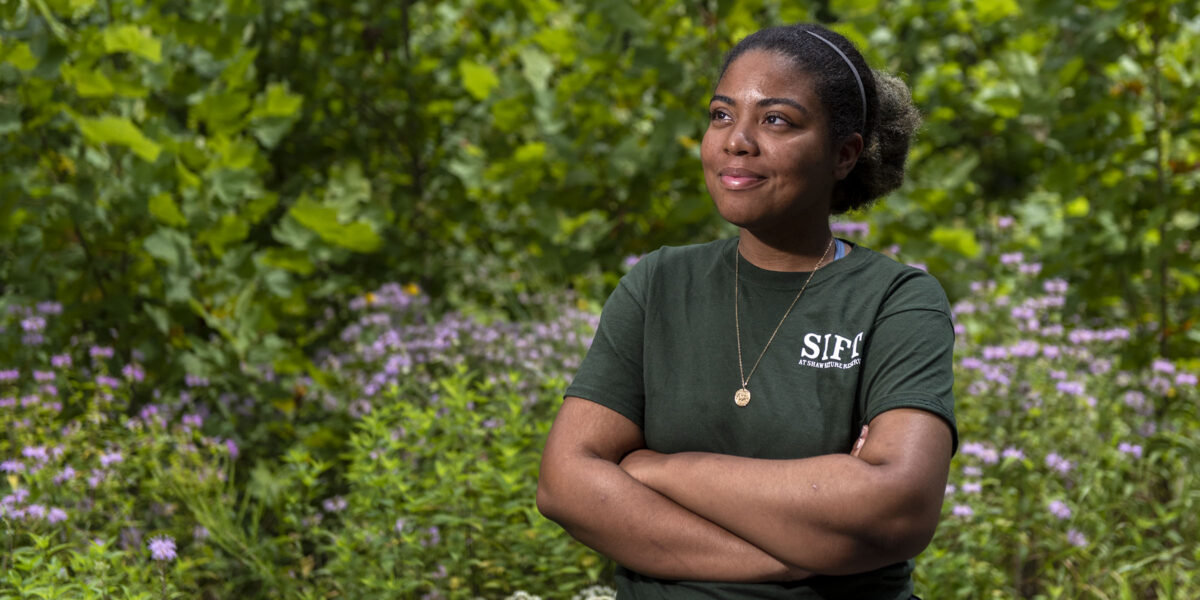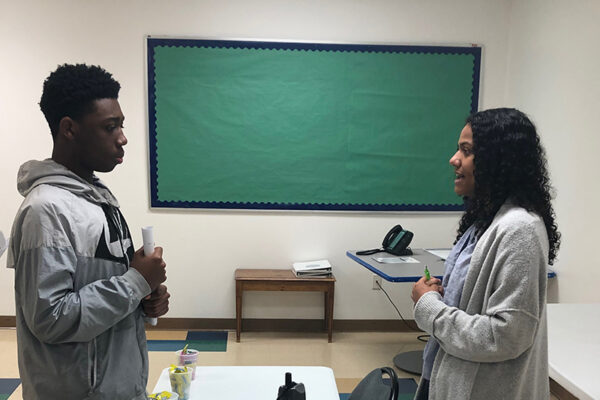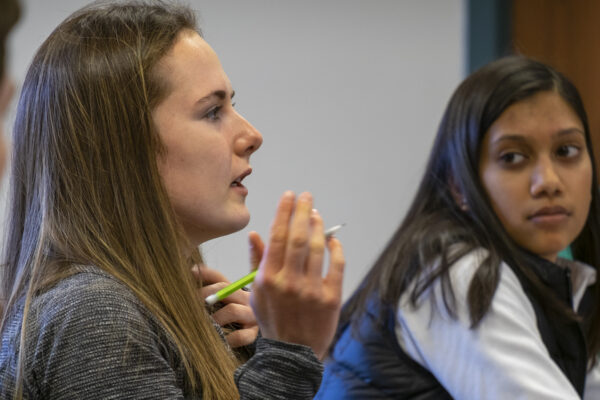Going abroad for a semester or the summer is a great opportunity, but the perfect internship isn’t always found halfway around the globe. From using art to build community to mentoring high school students in environmental biology research, Washington University in St. Louis undergraduates are finding that sometimes, the perfect internship is right down the street, offering experiences and teaching opportunities that far surpass expectations.
“Some of the best internship opportunities in the world are in St. Louis — from global leaders such as Emerson, AB InBev, Boeing, Bayer and Mastercard; national organizations like the Federal Reserve Bank, the Siteman Cancer Center, Edward Jones and Centene; along with the hundreds of startup organizations at Cortex Innovation Community and the T-Rex Innovation Center,” said Jim Beirne, the Career Center’s director of external relations.
“Our students are finding that they come to WashU for a world-class education, then stay to work here because of the phenomenal career opportunities.”
Summer is the ideal time to explore past interests and discover new ones. Less time spent studying in Olin Library means more time to venture off campus, and no, Forest Park doesn’t count. From making a name for themselves in the local music scene to celebrating a Stanley Cup victory, here’s a look at three undergraduates who took advantage of the rich culture and history St. Louis has to offer — while still gaining meaningful work experience.
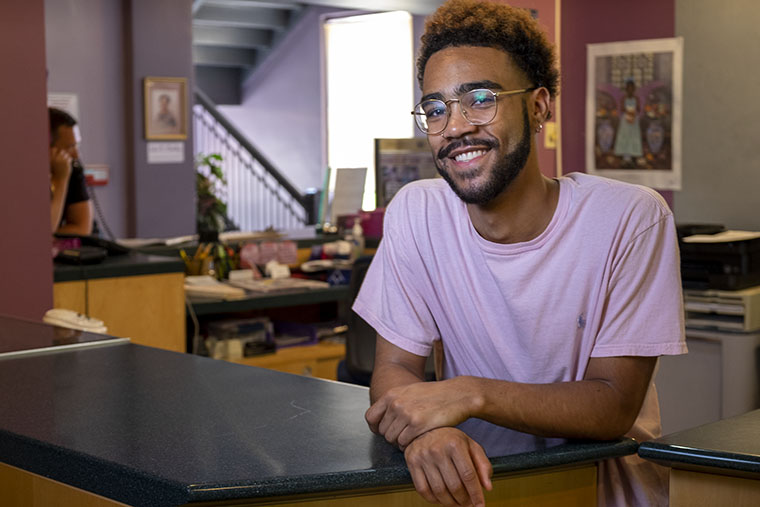
A passion for design
Surrounded by wax figures of prominent African American St. Louisans, rising junior Rob Hall kept cool from the St. Louis summer heat as a resident for the Griot Museum of Black History in north St. Louis. Part of the Gephardt Institute for Civic and Community Engagement’s Arts as Civic Engagement program, Hall was one of three students selected for a summer residency with a local arts organization.
“The program looks at how regional arts organizations can leverage art as a tool to build and help communities” Hall said. “It focuses on getting students really involved with the staff and the organization, which is why we’re called residents instead of interns.”
The Griot features exhibits of famous African Americans who hold strong connections to St. Louis. From Miles Davis to Madame C.J. Walker, the museum seeks to educate the community about Missouri’s rich African American heritage through its exhibitions and public events.
‘I think students should be involved in a community. … Staying in St. Louis is cool. It was definitely the right decision for me.’
-Rob Hall
This summer, Hall’s responsibilities included spearheading the Juneteenth Art Auction and Sale event.
“On my first day, I was appointed as the top coordinator, which was a little daunting,” he said. “Everything that had to do with the event streamed through me: designing flyers and marketing materials, coordinating with our community partners about receiving funding for the event, communicating with local artists, and actually putting up the art on the walls. We had around 120 pieces to display.”
Hall is no stranger to utilizing art as a means to engage community. A Detroit native, he co-founded an organization called Project 561 with some high school friends.
“The idea was to leverage our resources to bring people from the Detroit city and suburbs together through community service projects,” he said.
In its first year, Project 561 raised $38,000 and brought in more than 200 volunteers, who worked together to paint murals, enact new street signs and benches and install a community garden.
As a fine arts student majoring in design in the Sam Fox School of Design & Visual Arts, Hall has continued to cultivate his interest in design and creativity. He works as the creative entrepreneurship assistant in the Skandalaris Center for Interdisciplinary Innovation and Entrepreneurship and won the 2018 “Creative Student of the Year” award.
“I was already so interested in art as civic engagement before starting the Gephardt program,” he said. “In my work at the Skandalaris Center, I organized the Creator’s Gallery, which brings together creative people from all over WashU to display their work.”
Serving on the executive board of student publication Colour Magazine, creating music and performing throughout St. Louis also keeps Hall busy. During the summer, Hall has more time to explore St. Louis and cites Laumeier Sculpture Park and Cherokee Street as some of his favorite destinations.
“For me as an artist, there’s value in networking and getting more involved with the St. Louis art community throughout the summer,” he said. “A lot of groups at WashU encourage people to be involved in the St. Louis community, which I think is important. As students, we shouldn’t just ignore where we are.
“But at the same time, if people are going to do good work or gain a learning opportunity in another city, that’s great, too. I think students should be involved in a community, more importantly than feeling like they should stay in St. Louis. But that being said, staying in St. Louis is cool. It was definitely the right decision for me.”
-Helen Kaul
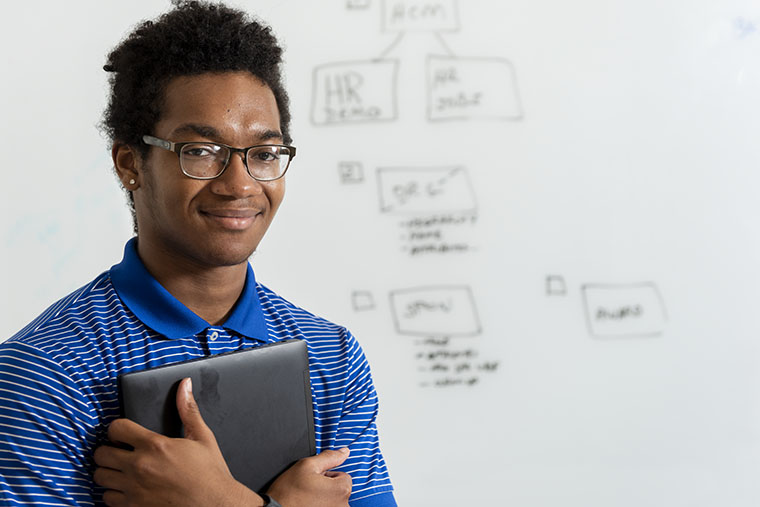
‘I want to make an impact’
Washington University wasn’t even on Arric Lucas’ radar when he was contemplating college. Though he was a native St. Louisan, he never would have suspected that the city in which he grew up would become the home he never knew he had.
Lucas, a rising sophomore, is double-majoring in computer science in the McKelvey School of Engineering and financial engineering through Olin Business School. This summer, he interned at Enterprise Applications (EA) on North Campus, which allowed him to pursue his two passions: business and computer science.
Lucas worked in the IT department, where the main focus is making sure that all websites, platforms and data are operating in sync. Though his job required him to complete many tasks, he found one particularly challenging: meetings, up to four a day, focused on different departments and different projects.
Like stand-up meetings, for example: a daily gathering focused on a team’s project and the number of jobs assigned to it at any given time, up to 10 or 20. Each team is composed of up to six members who report to the team leader. Lucas attended all those meetings and soaked everything in. He quickly learned the do’s and don’ts of working in a professional environment. When he wasn’t reporting to his team lead, Lucas was analyzing data to make sure that everything was running as smoothly as possible.
“The work I’m doing is something I didn’t even know existed as a student,” he said. “At first, I thought, ‘I just want to be a coder, just sit there and type all day.’ But that role doesn’t typically involve collaboration with others. I need to talk to people. This internship was a great combination of tech and business, which was perfect for me.”
‘The mindset I use to complete these independent projects has definitely developed from my courses at WashU.’
-Arric Lucas
Adding that second major in financial engineering was an important step for him. Through pledging Alpha Kappa Psi, a premier business fraternity at Olin, he learned skills such as resume-building, networking and teamwork. And while working as a teaching assistant for a computer science class led to one closed door, another quickly opened.
“My boss in the computer science class suggested I would do well working for Student Technology Services (STS),” he said. “I applied, but so many others did too.
“But one of the STS supervisors, Oana Jackson, offered to get me an interview at EA,” Lucas said. “Once I came here, I fell in love with the environment.”
And once he started the job, he quickly realized how well his coursework had prepared him.
“A lot of this job is being given information that you have to figure out on your own what to do with it and how to make everything work,” Lucas said. “You’re not given step-by-step instructions on what to do.
“But the mindset I use to complete these independent projects has definitely developed from my courses at WashU.”
Later this summer, Lucas will leave EA for a time to become a mentor with the Olin Fleischer Scholars Program (OFSP), a program for high school students from traditionally underrepresented backgrounds or populations. They learn everything from resume-building tips to how a business works.
The OFSP program holds a special place in Lucas’ heart, as he was a participant during his senior year of high school. This program was not only the catalyst for his love of business, but also his love of Washington University.
“OFSP was actually what got me interested in WashU, because I wasn’t really too familiar with that many colleges at the time,” Lucas said. “It’s basically where I began my entire college process.
“And I want to give these students the same insightful experience that I had. I want to make an impact on their lives.”
-Nina Lawrence
Broadening her perspective
Tyson Research Center, Washington University’s environmental research station, is 20 miles west of the Danforth Campus. Past a monitored steel gate and over a mile through the woods, that’s where Kayla Mans, a rising junior majoring in environmental policy in Arts & Sciences, worked this summer to strengthen the science communications skills of St. Louis-area high school students.
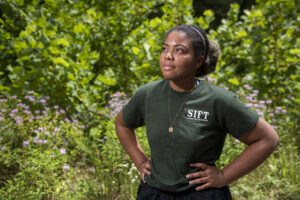
Mans chose the major because she likes writing and getting involved in environmental issues. She spent her days at Tyson teaching in the Tyson Environmental Research Fellowships (TERF) program, which places high school students as apprentices in university-based environmental biology research.
Teaching was the easy part for Mans; the challenge was getting up at 6 a.m. to coordinate carpools for both undergraduates who work at Tyson and the high school students. She would then meet up with the TERFers and the rest of the undergrads at the carpool pickup spot, and they all made the journey to Tyson together by bus. Making sure that everyone was counted and on board was typically her most important task on any given day, because leaving someone behind meant making another hour-long trip.
The TERF program is unique, Mans said, because the teenagers are able to work with the undergraduate students every single day, doing college-level research and participating in the community support activities alongside the staff. “The TERF program is a good opportunity for a high schooler to get the same research opportunity that an undergraduate would,” Mans said.
Mans credits Suzanne Loui, lecturer in environmental studies in Arts & Sciences, for guiding her to Tyson Research Center. She was in Loui’s class one day when the teacher announced they were going on a field trip to Tyson. “She’s the one who got me interested in environmental humanities and what it means to be an environmentalist,” Mans said.
And once Mans got there, she, too, found that her classes had uniquely prepared her for the Tyson internship.
“Environmental humanities classes gave me the chance to think about the environment in a way in which most people don’t,” Mans said. “I was able to relate the environment to people, and how people live in it, and not just to what people do to the environment.”
‘This whole summer has been an experience I would not have had if I were anywhere else in the world.’
-Kayla Mans
Another skill her professors demonstrated was the importance of being a personable and relatable mentor, a skill she has utilized on bus rides, in the lunch room and in the Tyson classrooms. Because she was able to spend so much time with her students, she got the opportunity to talk to the students and experience life with them in a way that a traditional teacher might not.
“Most teachers don’t eat with their students, and most don’t take their students home every day or check up on them to see how they’re doing,” she said. “But every professor I’ve had at WashU has constantly checked up on me to see how I’m feeling about the work and the class, and my life in general.
“This summer, I am able to see how valuable that one-on-one interaction is from the other side,” she said. “With the TERFers, it makes them more willing to learn.”
Mans, a native of Memphis, Tenn., was able to experience a summer in St. Louis and see things she didn’t have the luxury of seeing during her first two years at the university. “I was on campus all the time,” she said. “Now, I’m getting to experience the city and do things that I couldn’t do before.”
The time spent close to her university home has broadened her perspective. “It reminds me that there are other people living in the world who aren’t WashU students,” she said.
An added bonus: She had the good fortune to be here during the St. Louis Blues’ Stanley Cup championship run and parade. “The energy was something I’ve never experienced before,” Mans said. “This whole summer has been an experience I would not have had if I were anywhere else in the world.”
-Meghan Street
